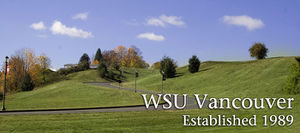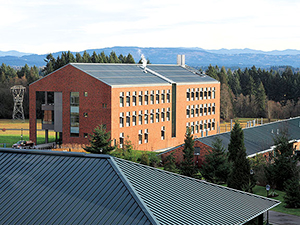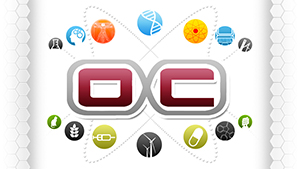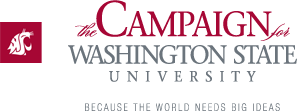Priorities:Washington State University Vancouver Student Priorities
Contents
Overview
Washington State University Vancouver offers to their students the opportunity to recognize the importance of innovation and entrepreneurship throughout its many areas of study. There is at least one course in every major that delves into entrepreneurship and why consideration should be made. The perceived reality of innovation and entrepreneurship occurs in the Creative Media and Digital Culture program as students are exposed to advanced topics in multimedia authoring and in special topics for specific fields in the digital world. The School of Science and Engineering has several courses on product fabrication and design. The Professional Sales Certificate of WSUV is open to students of every major and teaches important skills of self-marketing and business navigation while offering the opportunity to participate in national sales competitions. The innovation ecosystem is enhanced with weekly workshops on specific topics in technology, art, and leadership. Washington State University Vancouver also provides several opportunities for students to take their interest a step further. When students realize the importance of innovation and entrepreneurship they can get involved in a deeper way by applying for a real world internship through their program or by signing up for the small business policy course. This course exposes entrepreneur minded students to the world of market demand and product introduction and is applicable to every discipline imaginable. The campus also serves as a growing market for entrepreneurial focused clubs allowing space and mentorship for students to collaborate with and inspire each other. The school even offers a multitude of state of the art lab spaces with premier equipment and supplies for students to see their ideas become physical prototypes. With nearly two dozen specialized laboratories throughout campus there is no lack for developmental innovation resources to apply knowledge of innovation and entrepreneurship to specific challenges.
The students at the Vancouver campus are no strangers to the idea that innovation and entrepreneurship are possibilities for a strong and successful career future. The resources and inspiration exists throughout the ecosystem. There are however strong gaps in the ability for students to realize and reframe I&E goals. There exist multiple gaps in the resources available in terms of physical incubator space for students to create ventures or meet with project teams and while the main campus in Pullman Washington boasts a strong tech transfer office there is no equivalent resource available for the Vancouver students. In the near future, Washington State University Vancouver will need to address the concerns of realized and reframed innovation and entrepreneurship. The first steps to be taken are to harness the power of the existing resources and refocus some of the purposes on innovation and entrepreneurship and address the lacking resources in terms of physical space. It will take time to see a transformation of this level but the mindset is there and the students and faculty are ready to help make the changes happen.
Overview of Washington State University Campus Ecosystem
Calling all Students
Informational Session (come hear plans, offer feedback and help expand opportunities for all students)
- Where: Nouspace Gallery and Media Lounge
- When: October 25, 2013 @ 2:00pm
- RSVP: bmwouden8@gmail.com
Strategy #1: Take Advantage of Existing Resources
Following are an array of strategies that will fully address the realization gap over a 2-3 year period:
Tactic #1: Engineering Lab Boot Camp
- It’s a shame to see beautiful lab space not be fully taken advantage of by students. The state of the art engineering lab spaces were completed in 2011 and have been open to students since. An extensive amount of research and class work goes on inside the labs however they are not being used by students to innovate, fabricate and prototype student ideas that aren’t connected to their existing studies. It poses the question of how much the students realize their labs can do and if their knowledge of the equipment is deep enough to work on their own. A good amount of the available equipment is equal in quality and purpose to equipment used in engineering careers and a head start on use can only be beneficial. An Engineering Lab Bootcamp would engage students through a series of workshops on how best to make use of the resources they have available. It could offer the possibility of student interaction and collaboration to explore special topics and specific applications of their labs. It would help students realize the potential of entrepreneurship by providing the tools to innovate something new to benefit the world they occupy. Similar workshops have been adopted in the Creative Media and Digital Culture program and in the Fine Arts program. Guest speakers are brought in and students are provided with a one on one experience with the opportunity to make something of their own. When applied to the engineering department it would open up the student body to a new set of skills and opportunities for innovation and entrepreneurship.
- Team Leader: TBD (Preferabley a lab technician within the School of Science and Engineering)
- Milestones: Aim dates are Spring/2014
- Prepare engineering department with the ideas
- Facilitate faculty and guest speakers for workshops
- Find a consistant time for workshops to take place
- Market to students
Tactic #2: Vancouver Extension of WSU Pullman Office of Commercialization
- The Office of Commercialization at Washington State University in Pullman Washington is a successful transfer office that offers students consultation on preserving intellectual property, applying for patents and seed funding, and even offering incubator space for new companies to develop and grow. The students at WSU Pullman have a tremendous resource that operates alongside existing companies and with the mentorship of successful entrepreneurs and faculty. This incredible resource has been tremendously successful since its inception. However, the resource is only available to the students at WSU Pullman and no equivalent on the satellite campuses exist. A network of engineering, business, digital culture and art students are left without an incubator or research park to see the same realization of ideas. The infrastructure for the Office of Commercialization exists and the students in Vancouver are ready for this outstanding resource. By offering an equivalent of the Office of Commercialization, even on a small scale to start, students will have a place to begin with their student ventures. The status quo offers a patchwork quilt of resources for students that requires a great deal of research and effort to compile the right resources in the right places. By centralizing these resources through a tech transfer office it would make the ability for realization more available, accessible and efficient.
- Team Leader: Adam Denny
- Milestones: Culmination Spring 2015
- Idea proposal to Office of Grants and Research at Vancouver
- Proposal to Vancouver Chancellor
- Take idea to Pullman
- Seek out support (staff, space, money)
- Set up office in Vancouver
- Open to students
Tactic #3: Set up an available Intellectual Property Resource on Campus
- Innovation is already occurring at Washington State University Vancouver. Students are creating products and ideas that have great potential to go to market. Fruition of these ideas is occurring rarely however as students have no outlet to protect and go through the necessary bureaucracy to realize their goals. Outside resources are being sought and the intimidation of tracking down all the right paper work is a daunting task for some students, especially those with no exposure to the entrepreneur’s world. There are existing tactics already established at WSUV but they are hard to find and few and far between. The campus is in desperate need of a dedicated intellectual property resource for students to explore and have readily available. The beginnings of such a resource could be as simple as a web database with the necessary how-tos and paperwork of intellectual property with a long-term goal of having a department ready to field questions and guide students along their way to market. A resource like this would offer exposure to students who were unaware of the resources and give those with ideas a place to begin.
- Team Leader: TBD
- Milestones: TBD
Strategy #2: Extensive Reframing of I&E
Following are an array of strategies that will fully address Gap #2 over a 2-3 year period:
Tactic #1: Entrepreneurship Mentoring Program
- The Cougar Business Alliance marks the beginnings of mentoring opportunities. It is a network of WSU alumni who have experienced success as entrepreneurs and have remained in the community. The network consists of multiple fields ranging from restaurant owners, to web and media designers, and engineers who’ve created a business around a product they invented. The small business owners already connected to entrepreneurship and still involved in the ecosystem to this degree offer the opportunity to create student connection with students interested in following the same career path. An Entrepreneurship Mentoring Program would allow for community involvement appealing to the newly designated Innovation Partnership Zone in Vancouver and more chances for exposure to the real business world through internships. This type of program would address the gap of reframing of entrepreneurship on campus by taking the idea of entrepreneurship out of a university setting and placing it in the market. It would also offer invaluable experience in professional self-marketing and salesmanship and create possible investment networks for all participants.
- Team Leader: TBD
- Milestones: TBD
Tactic #2: Interdisciplinary Collaboration
- Washington State University Vancouver is a relatively small school. The campus is quickly explored on foot with every building mere minutes from each other. Students share library and study space and have classes for multiple topics in every building. Despite the tight campus and small student population there is little to no interdisciplinary collaboration on projects that aren’t specifically for a general education course. It is not uncommon to hear rumors that the collaboration is halted by faculty who are dedicated to their research and unwilling to interact with professors outside their expertise. This mindset halts the progress that could be achieved by bringing together opposing and differing views among students. Often times it isn’t that the students are unwilling to work together but merely that there are no opportunities to do so. This tactic is ultimately vague but is something that needs to be considered and addressed. It is a tactic that will forever be ongoing through the willingness of students to work with one another. This could include student to student teaching, interdisciplinary competitions or gallery showcases that require multiple disciplines participate. A successful venture is one that takes into consideration every possible outlet and makes use of the resources that other people can provide. To see an innovation or entrepreneurship project go through to success and fill the reframing gap at WSUV there must be a deeper interdisciplinary connection on the campus.
- Team Leader:Brittany Wouden
- Milestones: I want to have the first opportunity for team collaboration in February 2014
- Collaboration amongst students, start small
- Collaboration amongst involved faculty
- Organization of event (build weekend, start up weekend, innovation challenge etc)
- Funding for marketing and supplies
Tactic #3: A Dedicated Physical Innovation and Entrepreneurship Space
- The Campaign for Washington State has a goal for a research space in Vancouver in the long term.. This bold goal is currently in its funding stage with an estimated commencement date in late 2015. When one looks at the master plan for the developing campus in Vancouver there are multiple buildings in the works with the Innovation Space being a foremost goal. Although student involvement in this project isn’t explicitly necessary there should be a student voice on the project. The tactic would involve the formation of a student council to monitor the ongoing progress and be a communication channel for the students and alumni with a stake in the space. With deeper student interest and awareness of the project the planned space can really become something that students will be able to take full advantage of. It will help future students plan their university experience and allow students exploring graduate education a space for innovation in the long term. The road of innovation and entrepreneurship can be rough but with the right resources and space can be encouraging. WSUV is currently standing as a premier research university and an incubator space can take that research and transform it into so much more. The reframing of entrepreneurship begins with something as simple as a place to meet. Students should be aware that the university realizes this and has goals to meet these needs. The Campaign for Washington State offers this opportunity and provides long term goals for reframing of innovation and entrepreneurship in Vancouver.
- Team Leader: A member of WSUV DECA
- Milestones: Commencment date Late 2015
- Milesontes TBD
Other
Work has already begun at WSUV towards these broad long-term goals. Students in multiple disciplines are being pointed towards the Small Business Policy course in hopes that this mindset will spread back to their distinct majors. A student team has been formed under the Creative Media and Digital Culture program moving efficiently to an entrpreneurship event in December 2013 with more planned projects for Spring 2014. Many professors are offering special topics courses to specify education to interests and explore career paths that many didn't think existed. Startup Weekend is for the first time being considered at the campus. It will be an exiting journey for Washington State University Vancouver. It just has to start somewhere.
Impact
Related Links
Washington State University Vancouver
Related links



